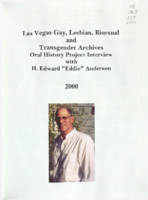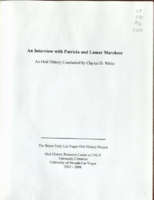Search the Special Collections and Archives Portal
Search Results

Craig Galati Interview, October 24, 2016: transcript
Date
Archival Collection
Description
always thought I'd be more urban. I would live in a downtown city. I wouldn't have a car. I would walk around. I would work on these big skyscrapers.” At one point in his life, architect Craig Galati dreamt of designing large buildings in some of the nation’s biggest cities. Instead, he was drawn back to his childhood home of Las Vegas, where he created projects meant to preserve the city’s integrity, such as the Grant Sawyer State Office Building and the first building at the College of Southern Nevada Charleston Campus. He speaks to his work in preservation at the Las Vegas Springs Preserve and in welcoming visitors to Mount Charleston with his Spring Mountains Visitor Gateway design. In this interview, Galati talks about his parents’ decision to move from Ohio to Nevada and what it was like growing up in Las Vegas. He recalls his first teenage jobs in the Las Vegas of his youth and his studies in architecture at the University of Idaho. He recounts the dilemma of struggling to find architecture work he enjoyed and how that vision drew him back to Vegas. He describes various projects in his portfolio from his early years to the present. He speaks highly of his partnership with Ray Lucchesi and the basis for their vision: “We wanted to be a place that everybody liked to work for. Buildings were just tools to do something grander. They weren't an object. We had a philosophy that was not object based, it was people based.”
Text

Transcript of interview with Rory Reid by Stefani Evans and Claytee White, July 13, 2017
Date
Archival Collection
Description
Rory Reid works in the Downtown Las Vegas building fully tattooed with a mural depicting a hand holding a bouquet of flowers of which the glowing central bloom is half brain and half heart. The story behind the mural is essential to understanding why the oldest of Landra and Harry Reid’s five children loves coming to work. Born in Alexandria, Virginia, he arrived in Las Vegas as a six-month-old with his parents and led a story-book life in the Reid house on Gretel Circle, down the street from Hansel Circle and right off Lilliput Lane. After attending Doris Hancock Elementary School, James Cashman Junior High School, and Ed W. Clark High School, he served a church mission in Argentina and studied international relations and Spanish and then law at Brigham Young University before returning to Las Vegas and joining Lionel Sawyer and Collins law firm. In this interview, Reid talks about administrative law, about leaving the firm to become an executive with Lady Luck Gaming Corporation, serving as Nevada Democratic Party chair for two years, and returning to Lionel Sawyer and Collins in 2000, where he remained until 2014. He shares his motivations for running for the District G seat on the Clark County Commission in 2002, and talks about the political climate in which he took office in 2003, a few months before fellow Commissioners Dario Herrera; Lance Malone; Erin Kenny, and chair Mary Kincaid Chauncey were indicted on federal charges following Operation G Sting. Following these highly public arrests, Reid focused on restoring faith in local government. In 2010, after two terms as Clark County Commissioner and Commission chair, Reid ran for Governor of Nevada as the Democratic nominee against Brian Sandoval. In that election, as Reid puts it, "the voters told me to do something else with my life," and he returned to his law practice. However, in June of 2014, his dear friend Jim Rogers passed away. The day after Rogers died Reid discovered that he was named co-trustee of Rogers's estate, along with his widow, Beverly. Reid and Beverly Rogers together founded The Rogers Foundation to be the primary advocate for public education in Nevada. The Rogers Foundation is housed in Downtown Las Vegas in the building tattooed with the bouquet. The mural-the Wall of Understanding-is The Rogers Foundation's answer to political calls for "building a wall" and a show of solidarity with the students they serve, many of whom are undocumented immigrants or have undocumented immigrant family members. For the man who helped restore the reputation of Clark County government and who emphatically declines to run for further public office, fulfilling the mission and the work of The Rogers Foundation is one of his greatest joys-along with his family; his beagle, Oakey; and watching Liverpool compete in the English Premier League (especially when Liverpool plays his brother's favorite team, Manchester United).
Text

Transcript of interview with Frank Paul Silver by Barbara Tabach, August 29, 2017
Date
Archival Collection
Description
In 1973, Dr. Frank P. Silver ( 1934 - ) escaped the bitter weather of Philadelphia with his choice to relocate his OB/GYN medical practice to the small community of Boulder City. In his reflections of the move, Dr. Silver recalls his wife Elaine had little input in the initial move. However, with four children to manage, she soon made a home for the Silvers. Before the move, Dr. Silver was a lifelong resident of the Philadelphia area. He graduated from La Salle University, Jefferson University Medical School and did his residency at Nazareth Hospital – all in Philadelphia. In Southern Nevada he enjoyed the weather and the excitement of building his medical practice. He mentions occasional challenges of being Jewish in the 1970s in the area. He also talks about being a shareholder in the Crystal Palace, a Laughlin casino.
Text

Transcript of interview with Randall "Randy" Walker by Stefani Evans, November 2, 2017
Date
Archival Collection
Description
In twenty-first-century, urban America, Randall "Randy" Walker is one of the few fathers who can say he raised his children in the same house in which he grew up. Walker did not inherit the house at 443 Republic Street, in Henderson. Instead, Walker bought the house from his parents after he graduated from Brigham Young University in Utah, worked with Exxon Oil Company in Houston, returned to Southern Nevada to work in his first government job as a budget analyst for Clark County, and sold the house he previously owned. He did not have to move his wife and children far-their previous home was at 442 Republic Street, directly across from his parents. In this oral history, Walker shares why his family came to Henderson in 1952, describes growing up in the small town of his youth, and tells what it was like to have his father as his high school Spanish teacher. He focuses on his career in government and how he applied his accountant mindset to the various positions he held with Clark County, the Las Vegas Metropolitan Police Department, the City of Las Vegas, and McCarran Airport. Along the way he shares his experiences with large governmental building projects such as the first 911 Call Center, the Downtown Transportation Center, the Regional Justice Center, and at McCarran Airport, the D v Gates, Terminal 3, and the airport tunnel and connector roads. He explains how his work with these various projects brought him into interaction with such diverse fields as architecture, accounting, construction, design, infrastructure, public art, public safety and local, state, and national politics. Throughout, Walker displays the collegial and common-sense approach to government, leadership, and problem solving that grounds the decisions he makes and explains why Richard Bunker wanted him at Clark County, why Clark County leaders recruited him to be county manager (and why that did not happen), and why McCarran Airport was able to accommodate without interruption Southern Nevada's record-breaking growth in residential and tourist traffic, and why, even in his absence, McCarran was the first major airport allowed to reopen following the 2001 September Eleventh terror attacks.
Text

Chelsie Campbell interview, January 9, 2019: transcript
Date
Archival Collection
Description
Chelsie Campbell is a Cuban-American attorney and lobbyist. Born on October 4, 1979, Chelsie is a native Nevadan and grew up in Las Vegas. Her mother, Norah Campbell, came to Las Vegas after the Cuban Revolution and works as an elementary school teacher. Her father, Alan Campbell, was a former teacher and hotel manager. An advocate for the Latino community, Chelsie has dedicated her life to advocacy. Her involvement began at UNLV where she found her voice through the Student Organization of Latinos (SOL). During her time with SOL, she advocated for the elimination of the social security requirement in UNLV’s admission process and lobbied for the retraction of Las Vegas Review Journal’s racist article on Latino students. Her activism in SOL also helped established additional SOL chapters across Las Vegas high schools and at the College of Southern Nevada. After earning her Bachelors in Broadcast Journalism and Spanish Literature from UNLV, Chelsie attended William S. Boyd Law School where she graduated in 2005. Chelsie also attended University of Nevada, Reno where she received her master’s in Management and a graduate certificate in renewable energy. Chelsie worked for Mach One Group as Editor-In-Chief of its two publications, Nevada Family Magazine and La Familia de Nevada. After law school, Chelsie began working at NV Energy as a spokesperson and worked her way up to government affairs. Chelsie is currently working as an independent lobbyist and choses her clients. Her clients include Clark County School District and NV Energy. Her work as a lobbyist includes helping agencies prepare for Nevada’s legislative session, conduct public policy research, and help with educational outreach. Through her activism, Chelsie has worked for former Senate Majority Leader, U.S. Senator Harry Reid. Chelsie is also part of the inaugural class of Emerge Nevada, a political leadership-training program for women in Nevada. Chelsie is on the Board of Trustees for the Leukemia and Lymphoma Society of Southern Nevada, the Chairwoman for the Nevada Advisory Board for CPLC Southwest, Board Member for the Advisory Commission on law-related Education for the State Bar of Nevada and serves on the Governmental Affairs Committee for the Latin Chamber of Commerce. She is the former President for the Boyd Law School Alumni Chapter and the Board of Directors for the Gray Plunkett Jydstrup Living Facility. Chelsie would like to dedicate her oral history to her parents: Without them, I wouldn’t be here.
Text

Eddie Escobedo interview, February 25, 2019: transcript
Date
Archival Collection
Description
Interviewed by Maribel Estrada Calderón. Claytee White also participates in the questioning. Eddie Escobedo was born in 1961 and two years later, he and his family immigrated to the United States. He fondly remembers his father, Edmundo Escobedo. Escobedo is currently in charge of the newspaper that his father started, El Mundo Newspaper.
Text

Nora Mirabal interview, August 30, 2019: transcript
Date
Archival Collection
Description
Interviewed by Elsa Lopez and Barbara Tabach. Cuban refugee family by way of Spain and then to the US; arrived in Las Vegas in 1973 when Nora was 9 years old. Struggled in youth but rises up as embraces educaton. Currently is Assistant Director of Academic Partnership at CSN.
Text

John Robinson Pacheco interview, June 24, 2019: transcript
Date
Archival Collection
Description
Interviewed by Laurents Bañuelos-Benitez. John Pacheco's father, Francisco, arrived in Las Vegas in 1942. John was born in 1947 and raised mostly on 27th Street. He is a graduate of Rancho High School and UNLV. He is a retired artist known for hand-painting signage for many local businesses. As a very civic minded person, John has received many local awards and served on committees for the Las Vegas Chamber of Commerce, East Las Vegas community, and much more.
Text

Transcript of interview with Edward "Eddie" Anderson by Dennis McBride, October 11-14, 2000
Date
Archival Collection
Description
Dennis McBride interviews Eddie Anderson (born 1946) about his role in advocating for LGBT rights, specifically his participation in the various political and social movements during previous decades. The interview begins with a discussion of Anderson’s background, including his experiences growing up in children’s homes and living with his grandparents. Anderson mentions marching with his grandparents for both workers’ and women’s rights as some of his first political involvements. Anderson also discusses his original aspirations for becoming a priest as well as his memories of meeting President John F. Kennedy during a visit to his high school when Anderson was student body president. Anderson then discusses travelling to the South, specifically in Selma, Alabama, during one summer while in high school in order to help register Black voters. Anderson then discusses his friendship with Nevada Senator Bill Raggio and his wife, and his joining of the U.S. Navy, where he met President Ri
Text

Transcript of interview with Pat and Lamar Marchese by Claytee White, January 16, 2008
Date
Archival Collection
Description
Pat Marchese grew up in Johnston, Pennsylvania, and Lamar was reared in Tampa, Florida. Pat was raised on a farm surrounded by relatives. Lamar takes pride in his mother heritage, which can be traced to Tampa Bay, Florida, in the early 1840's. Pat and Lamar graduated from the University of South Florida and relocated to Las Vegas in 1972. Pat's remarkable 30-plus year passion includes working for the city of Las Vegas and Clark County, Nevada. She created numerous art and cultural programs which consist of the Civic Symphony, Charleston Heights Arts Center, Rainbow Company Theatre, along with consulting work for the Allied Arts Council. In addition, to her creating art and cultural agendas, she became a budget analyst and chief lobbyists for the county, testifying before the Senate Taxation Committee. She implemented through the public arts program, a Mural Arts Series, the Parks and Recreation Cultural Division, and culture on the Strip. Pat executed the grant that ensured the necessary funding for the expansion for public broadcasting radio stations throughout California, Utah, Arizona and Nevada. She's certainly worthy of her title "Queen of Las Vegas Culture". Lamar's amazing 30-plus year's calling comprises putting into action an abundant number of libraries programs for the State of Nevada along with establishing the first public broadcast radio station in Nevada. His library accomplishments include merging the City's libraries branches, library programs, shows, concerts, unification of academic libraries and public libraries and the first reciprocal borrowing agreement for the State of Nevada with the Nevada library card. He consolidated Las Vegas Libraries and the Las Vegas Clark County Library District. He also sold bonds for the development of future libraries. Lamar's broadcasting achievements consist of incorporating the Nevada Public Radio Corporation with State of Nevada, serving as Chairman of the board for NPRC, constructing broadcasting translators and radio stations throughout the tri-state and enveloping the State of Nevada through public broadcasting. Combined, Pat and Lamar Marchese have served the Las Vegas community for over six decades. Thanks to the Marcheses, broadcasting is thriving throughout the tri-state area, libraries are blossoming and cultural programs are flourishing. They are looking forward to retiring, traveling, spending time with loved ones, and most of all, Pat and Lamar time together.
Text
